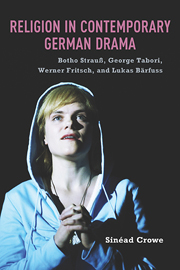 Religion in Contemporary German Drama
Religion in Contemporary German Drama Book contents
- Frontmatter
- Contents
- Acknowledgments
- Introduction: Definitions and Themes
- 1 The Relationship between Theater and Religion
- 2 Religion in Modern European Theater and Drama
- 3 “No One Wants to Get to God Anymore”? Botho Strauß's Groß und klein and Die eine und die andere
- 4 Theological Farce: George Tabori's Mein Kampf
- 5 “The Last Refuge for Metaphysics”: Werner Fritsch's Theater Theory
- 6 “The Feeling of Faith”: Fritsch's Wondreber Totentanz and Aller Seelen
- 7 Belief and Unbelief in the Twenty-First Century: Lukas Bärfuss's Der Bus (Das Zeug einer Heiligen)
- Conclusion
- Bibliography
- Index
Introduction: Definitions and Themes
Published online by Cambridge University Press: 05 May 2013
- Frontmatter
- Contents
- Acknowledgments
- Introduction: Definitions and Themes
- 1 The Relationship between Theater and Religion
- 2 Religion in Modern European Theater and Drama
- 3 “No One Wants to Get to God Anymore”? Botho Strauß's Groß und klein and Die eine und die andere
- 4 Theological Farce: George Tabori's Mein Kampf
- 5 “The Last Refuge for Metaphysics”: Werner Fritsch's Theater Theory
- 6 “The Feeling of Faith”: Fritsch's Wondreber Totentanz and Aller Seelen
- 7 Belief and Unbelief in the Twenty-First Century: Lukas Bärfuss's Der Bus (Das Zeug einer Heiligen)
- Conclusion
- Bibliography
- Index
Summary
IN THE EARLY YEARS of this millennium, religion “returned” to the stage, causing a good deal of surprise, interest, and exaggeration among observers of German theater. “Neuerdings beschäftigt sich das Theater wieder ganz gern mit der Religion” (The theater has recently become quite preoccupied with religion again), asserted Matthias Heine in the newspaper Die Welt. “Glaubens- und Religionsthemen erobern die deutschen Bühnen” (Themes of belief and religion are conquering the German stages), wrote Christine Dössel in the Süddeutsche Zeitung. In the 2005 German studies yearbook Jahrbuch für Internationale Germanistik, Katharina Keim maintained that there had been a “Wiederkehr des Religiösen im deutschsprachigen Theater heute” (return of the religious to German-language theater today). The theater journal Die deutsche Bühne devoted a special issue to the theme “Theater und Religion” in June 2005, claiming “Lange nicht mehr waren Theater und Glauben, ja Theater und Kirche so nahe wie in diesen Tagen” (It has been a long time since theater and faith, indeed theater and church, were as close as they are these days).
Religion seemed ubiquitous during the 2004–5 theater season. The Volksbühne Berlin, which five years earlier had devoted a season to the theme “Ohne Glaube leben” (Living without belief), adopted the slogan “Religion ist ein Anker” (Religion is an anchor) and premiered as its centerpiece Ulrich Seidl's Vater Unser (Our Father), an exploration of the psychology of religious faith. Hamburg's Thalia Theater premiered Lukas Bärfuss's Der Bus (Das Zeug einer Heiligen) (The bus [The making of a saint]), the plot of which revolves around the persecution of a devout Catholic in an unbelieving Germany.
- Type
- Chapter
- Information
- Religion in Contemporary German DramaBotho Strauß, George Tabori, Werner Fritsch, and Lukas Bärfuss, pp. 1 - 14Publisher: Boydell & BrewerPrint publication year: 2013
